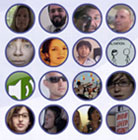Digital Nation
 Last night I visited WGBH for a preview of FRONTLINE’s Digital Nation – an upcoming documentary that will explore how the Web and digital media are changing the way we think, work, learn, and interact - and a discussion with the documentary’s producer, Rachel Dretzin. The preview and discussion were truly thought provoking and I found that some of Dretzin’s opening comments really touched a nerve. She referred to her dominant emotion around the current digital age as anxiety, with a feeling that people are “drowning in a sea of emails and text messages.” She also expressed her disdain over realizing that her kids “reach for technology to fill an empty space.”
Last night I visited WGBH for a preview of FRONTLINE’s Digital Nation – an upcoming documentary that will explore how the Web and digital media are changing the way we think, work, learn, and interact - and a discussion with the documentary’s producer, Rachel Dretzin. The preview and discussion were truly thought provoking and I found that some of Dretzin’s opening comments really touched a nerve. She referred to her dominant emotion around the current digital age as anxiety, with a feeling that people are “drowning in a sea of emails and text messages.” She also expressed her disdain over realizing that her kids “reach for technology to fill an empty space.”
I can relate. Though it’s early yet (I think, with Laurel being 4) I do have concerns about how to navigate the digital waters with her in the future. I am, in fact, drowning in - and am highly anxious about the state of - my overflowing inbox. And I am utterly guilty of reaching for my Blackberry to fill even the briefest of empty spaces, such as when Laurel goes to use the potty, or Jon walks the trash and recycling out to the curb. Truly, I’d be better off meditating for those 30 seconds.
We heard about some of the negatives of the digital age (e.g., a teenager who found it more complicated to erase an ex-girlfriend from his digital than real life) and the benefits (e.g., an inner city school that is showing a significant decrease in violence and increase in academic performance through use of technology). Yet despite the positives, and my own reliance on technology, I found myself fretting over the negatives. As a parent and former neuroscientist turned graphic designer and triple blogger who actively utilizes social media (indeed tweeting periodically through the presentation), I was having trouble reconciling all of the awesomeness of the digital age with the images of kids staring at laptops, or the carpal tunnel pain shooting through my right arm.
Specifically, as a parent, I want my daughter to be active and engaged with the real world through everyday activities (e.g., parks, art projects, etc.). As a writer, editor, and designer, I’ve been feeling increasing concern about my own tech time, and have been trying to counterbalance it with exercise, or by doing something necessary and active (e.g., a walk to the mailbox) instead of checking Facebook and Twitter in moments of boredom or procrastination. And as a former academic who spent 10 years dedicated to studying human perception and action, I have serious concerns about the long term effects of the digital age given that humans simply did not evolve to spend this much time hunched over keyboards or mobile devices.
Clearly, I’ve got some issues around all of this, and no doubt other folks do too. And if you want to air them, you actually can. Rather fittingly, the way Dretzin and her colleagues are assembling Digital Nation is very different from traditional documentary making, where the crew shoots and creates the documentary in a vacuum of sorts. Instead, editorial segments are available for viewing online and users are welcome to provide feedback and also share their own story. The ultimate goal being that the user input will help shape the final product. Really, really cool stuff. One of the positives of the digital age, in fact.
Following the meeting, fellow attendees Angela (Mommy Bytes) and Christy (More Than Mommy) also pointed me to FRONTLINE’s Growing Up Online, which Angela described as mind blowing and Christy as, “a very powerful statement about how some kids use the Internet to define themselves, connect with each other, communicate, and even rebel.” I’m bracing myself to view the segment, and then I’m going to go do some counterbalancing yoga with Laurel.
